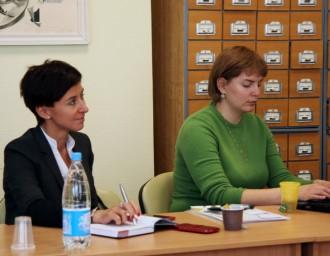Aliaksandr Perasypkin: There are no easy ways for Bologna transformations

Belarusan specialists in higher education learn from their Ukrainian colleagues at an expert meeting, entitled "Joining the European Area of Higher Education by Post-Soviet States"
On 12 February, another in-country expert meeting dedicated to the post-soviet states' experience in adoption the Bologna principles in higher education took place in Minsk. Belarusan experts had a chance to meet Taras Finikov, President of the International Foundation for Education Policy Research, and a former Ukrainian Deputy-Minister for Education and Science.
While Lithuania's joining the Bologna process was part of its alignment with the EU, Ukraine has taken a different path that did not suggest deep institutional changes.
Ukraine had been preparing to enter the European Area of Higher Education for three years and finally joined it in May 2005. The results of this step did not take long to manifest. The participation of Ukrainian universities' in international educational programmes has been enhanced, while the development of private segment in higher education intensified dramatically. Today, Ukraine is one of the five countries with the largest number of students together with Russia, Turkey, Germany and the UK.
However the first problems and difficulties revealed themselves a bit later: the new education system did not match the old law "On Higher Education". Even in its new version the document was adopted already outdated, with no significant changes, as amended. This problem remains one of the main: although the new law is being considered for more than a year already no tangible results have been achieved so far. The current amendments and modifications continue facing a serious dissatisfaction of the main stakeholders. Most decisions taken in the field of higher education lack coordination and prevent the Ukrainian universities from developing in one particular direction.
The introduction of the National Qualifications Framework as set of institutional mechanisms of legal regulation of the demand for skills from the labour market and the supply of qualifications by education and training systems also came across some obstacles. As it was notices by Finikov, despite the fact that the National Qualifications Framework was adopted in autumn 2010, its full operation was undermined due to lack of interest on the part of universities and student organisations, as well as trade unions and employers. The established framework differs significantly from its European prototype and remains formal. The Ukrainian model of the Credit system is also far from being fully complied with the generally accepted European standards and rather represents a hybrid of credit-modular system, which partly reflects the module-rating system of the late 1980s, and the credit system of the European Higher Education Area.
In spite of the fact that Ukraine has been in the European Area of Higher Education for more than six years, it is still too early to talk about the country's fully-fledged participation in the Bologna process. As it was noted by one of the participants of the discussion Aliaksandr Perasypkin of the Belarusan State: "There are no easy ways for Bologna transformations. The Ukrainian experience shows us difficulties arising after the adoption of the country in a single space of higher education. Belarusans in the future, I believe, should stress for themselves the transparency and publicity of the process. Reform, built on the principles of Bologna, must pass for wider participation of not only the major players, including the Ministry of Education, universities' management, and employers, but also students, their parents and the media. "
The Minsk-based Office for European Expertise and Communication was among the organisers of the discussion.
-
03.01
-
07.10
-
22.09
-
17.08
-
12.08
-
30.09



























